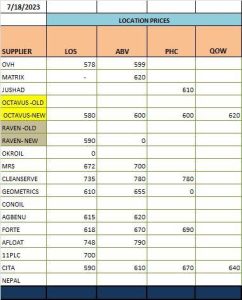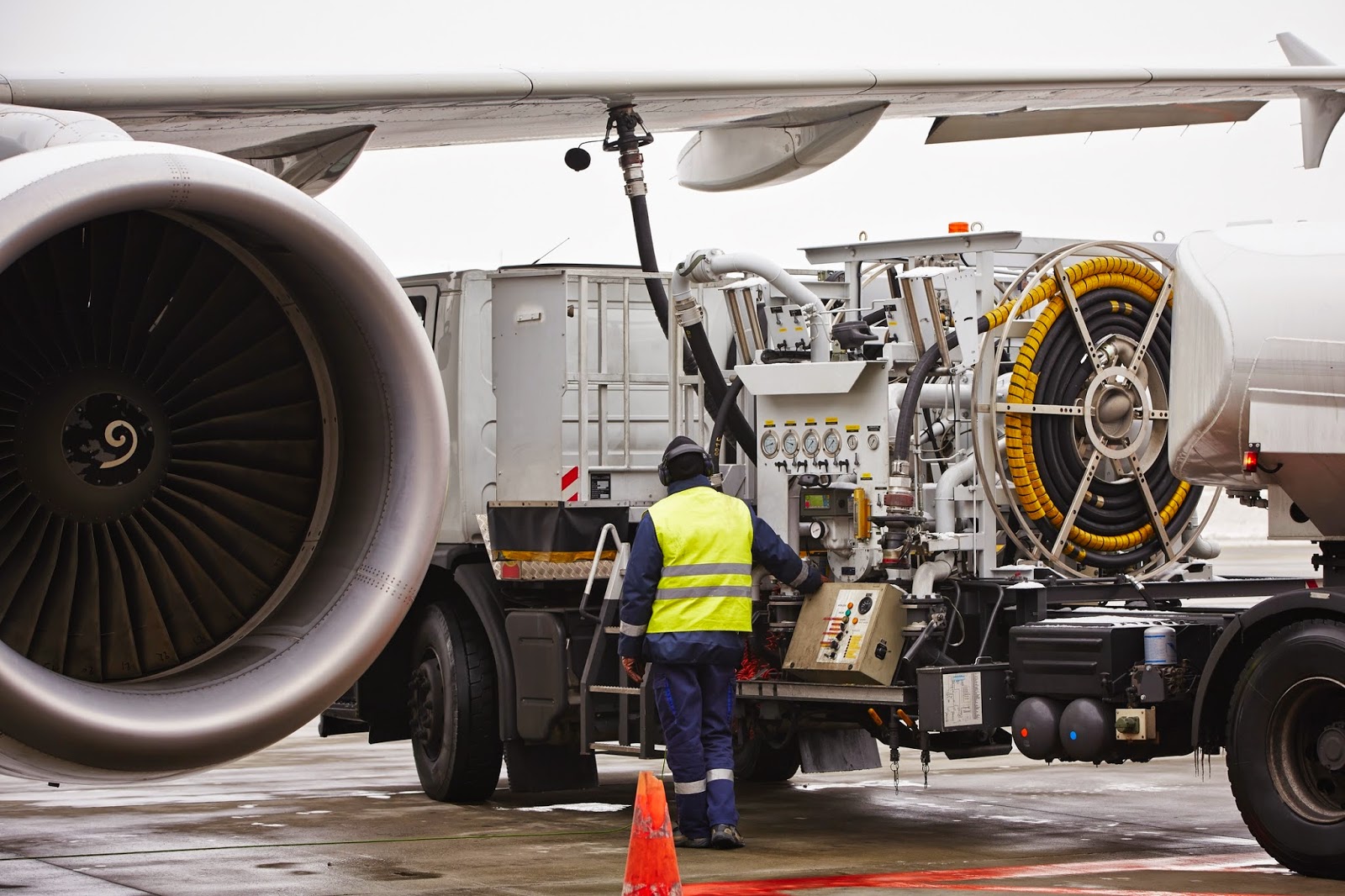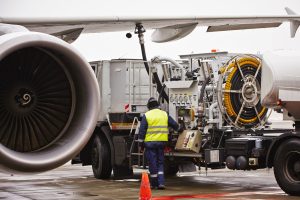Contaminated fuel in the aviation sector may become a major threat to air safety in Nigeria, if stringent measures are not taken by the concerned regulators.
Watching the Max Air aircraft, Boeing B737-300 with registration mark, 5N-MHM, being discharged of water from its fuel tanks was really horrifying, as petrified potential air travellers continue to share the video on social media.
However, aviators are not alarmed like those who are not conversant with airline operation, even though they are also are awake to the dangers of having water in aircraft fuel tanks.
As at press time, the Nigeria Civil Aviation Authority (NCAA) was yet to explain what actually happened that so much volume of water was found in an aircraft that was operating before the regulatory authority grounded the fleet.
What is mysterious about the incident was that Max Air sourced fuel from the same marketing company for its two aircraft, but while the Boeing B737-300 had water in its tanks, the second Boeing B737-400 with registration mark, 5N-MBD was not found with water in its tanks. Also, no other aircraft operated by any other domestic airline was also found with water in its tanks. This fact makes the matter more complex because it would have been easy to conclude that the water came from the oil marketing companies the product was sourced from but so far, no report has indicated that other airlines have reported similar incident.
However, NCAA strongly suspects the oil marketing companies.
In a zoom press conference with aviation journalists, the Director General of NCAA, Captain Musa Nuhu, made it clear that the agency was investigating three oil marketing companies that the airline sourced aviation fuel from.
Investigation
Nuhu, last week, told aviation correspondent that the authority dispatched its inspectors to Kano to audit Max Air operations. He said Azman Air’s two Boeing B737 aircraft were grounded because one had water in its tank, while the other had technical problems and they would only be allowed to go back to service if they were found airworthy after the audit.
The Director General also said NCAA would close any aviation fuel marketing company that sells contaminated fuel to airlines, stating that the regulatory body is already investigating the airlines that bought fuel from the companies that sold contaminated fuel to Azman Air.
Explaining further on why Azman Air aircraft were grounded, Captain Nuhu said investigation already carried out disclosed that the aircraft in question took fuel from three oil marketing companies in Kano, Abuja and Lagos and NCAA was investigating where the water came from and tracing the source of the bowser to pumps and storage facilities.
“When we found out, we are going to suspend the marketing company. We will collaborate with the Nigerian Midstream and Downstream Petroleum Regulatory Authority (NMDPRA) to ensure it does not happen again. We want to make sure that the marketers meet our regulation to supply their products to the airlines,” Nuhu said.
According to him, it is the responsibility of flight crew to inspect the fuel that is taken by the aircraft to make sure that it is not contaminated, so the flight crew and airline are held responsible if such case arises.
“We are going to issue a notice to ensure that flight crew always inspect fueling of aircraft and if after investigating we found out that Max Air was responsible, we will take appropriate action. NCAA inspects the facilities of the oil marketing companies but we don’t have the staff that will go to every airline to inspect their fueling. Do you know how many aircraft that are fueled every day in Lagos?” he said.
Recurring Incident
This was not the first time an aircraft operated by Nigerian airline contained water in its fuel tanks. About two years ago, Aero Contractors aircraft refueled in Port Harcourt on its way to Lagos and Arik Air aircraft refueled from the same marketing company. THISDAY gathered that on impulse, the pilot of the Aero Contractors flight decided to check the tanks and found out that the fuel was contaminated with water.
“That was at the point the airline was to call for boarding. The Aero Contractor’s pilot signaled the Arik Air pilot to abort his planned flight and check the aircraft tanks, disclosing to him what they found. The two aircraft had water in their tanks as well as aviation fuel,” an insider recalled to THISDAY.
Also, THISDAY learnt that the oil marketing company was sanctioned after investigation was carried out and since then there was no such incident reported until recently.

Threats
THISDAY gathered that contaminated fuel could cause significant damage to the aircraft engine and such damage could range from fuel system corrosion, clogging of fuel filtration components, failure of aircraft fuel system instrumentation, and even stopping the fuel supply to the engine during flight.
The Director General of NCAA said flight crew, especially the pilot ought to inspect aviation fuel before his aircraft is fueled to ensure that contaminated fuel is not put in his aircraft.
An official from Dana Air told THISDAY that the airline carries out water testing in the engines of its aircraft and before it fuels the aircraft, the pilot, the engineer and the auditor must inspect the product to ascertain its quality and ensure it was not contaminated before approving for fueling.
Recently the Managing Director and Chief Executive of Aero Contractors, Captain Ado Sanusi, told THISDAY that the airline has quality assurance department that checks on the quality of aviation fuel it buys. The personnel in the department scrutinisesthe company that serves fuel to the airline and carries out investigation on the quality of the product it supplies to the company.
“We have intensified the check for contaminants. We do regular checks on the bowsers. Our quality assurance team checks the company that is selling to us and despite the fact that we have the rule before; we have made it mandatory for the Captains to test the product before it is dispensed into the aircraft. We always carry out checks on water and other contaminants,” Sanusi told THISDAY.
Vigilance
In his reaction to the contaminated fuel incident, the Chairman and CEO of United Nigeria Airlines and the spokesman of Airline Operators of Nigeria (AON), Professor Obiora Okonkwo, called on the NCAA to be more vigilant with the operations of fuel marketers in the sector in order to prevent supply of contaminated products to airline operators.
According to Okonkwo, the NCAA has taken the right step to investigate the source of the contaminated aviation fuel involving Max Air’s Boeing 737-300 aircraft of July 7, 2023.
Okonkwo also stated that there are certain measures taken by fuelers and airlines before fuel is dispensed into the tank of aircraft, saying such steps should be adhered to strictly by all operators.
He also called on NCAA to carry out a pseudo audit of the fuel marketers in order to ensure total compliance with industry standards.
He lauded the current management of NCAA, led by Capt. Musa Nuhu, saying that the apex regulatory body in the sector has lived up to expectations so far.
He said: “The plan to investigate the fuel marketers is a confirmation of all what I have been saying all along that we have an active and vibrant NCAA, which guarantees safety of the air passengers. It can only take a vigilant regulator to observe when there is a problem and if they have gone as far as identifying with the supplier of bad fuel, we are happy with that development.
“As for Max Air, there is nothing absolutely to worry about. It can happen to any airline anytime. If there are questions from NCAA, it is left for them to give answers to the agency, which I’m sure they will do. The NCAA that we have now as led by Capt. Nuhu, is one of the best in the world.”
On the statement by NCAA that airlines and pilots are responsible for the quality of fuel dispensed in their aircraft tanks, Okonkwo said that this was for the interest of the airlines and the flying public.
He said that this would make the operators more responsible to their responsibilities of ensuring safety and strict adherence to Standard Operational Procedures (SOP).
He however appealed to NCAA to put in place more acceptable audits on the fuel suppliers, stressing that the airline operators had consistently canvassed this position.
The Genesis
The Managing Director of Flight and Logistics Solutions Limited, Amos Akpan told THISDAY that in the 1980s/90s aircraft were still fueled through the dump (hydrants) pumped directlyfrom the ramp. He said that quality test tool was done by fuel technician right in the presence of airline’s engineers.
“Now the tankers and bowsers are all over the airport because no more supplies through the dump.Between 2001 and 2017, when I was managing Fresh Air, we go to Depot at GAT (General Aviation terminal) or at international airport road to see them test before they load the bowsers.The responsibility for quality test is the duty of the supplier. The aircraft engineer supervises the fueling in compliance with his company’s fuel manual.
“The fuel supplier has manuals and SOP which NCAA approves and must be followed in the line. NCAA has oversight responsibility to ensure compliance. The fuel company has to be inspected and audited periodically to ensure compliance,” he said.
Akpan therefore urged NCAA to thoroughly investigate the water found in the Max Air aircraft, trace its origin; so that the agency would be able to prevent such from happening again.
“In my opinion, NCAA and Max Air must investigate the water in fuel tank issue thoroughly. Punishment must be given for negligence to deter further/future occurrence; but most importantly cause and effect must be recorded in bulletin and circulated to operators and fuel suppliers for lessons and avoidance.That’s my humble practical experience from the field,” he said.
The Controversy
A visit to Standard Organisation of Nigeria (SON) in Lagos on Tuesday by THISDAY, revealed that there could always be minimal volume of water in petroleum products due to vaporisation. One of the experts explained this fact to a team from Aviacargo Committee from the Federal Airports Authority of Nigeria (FAAN) that paid a visit to the federal agency. The expert stated that such water was not allowed in the petroleum product, but said about 0.02 per cent could be contained.
THISDAY also learnt that Jet fuel and hydrocarbons generally absorb or release water (through condensation) in all storage tanks including aircraft tanks. If the operational personnel fail to drain water from the tanks including aircraft tank daily, water will accumulate in the tank. When ambient temperature becomes hot, the fuel hydrocarbon chains become unstable until it absorbs water from the atmosphere to attain equilibrium. When the temperature drops, the fuel become unstable until it releases the water it absorbed earlier. It will not re- absorb the free water released because it is in liquid state again but will rather absorb water- vapor from the atmosphere that can easily dissolve into its chains to attain equilibrium always when temperature rises.

THISDAY also gathered that dissolved water is harmless to the aircraft and cannot be detected by chemical water detector but the released free water can harm the aircraft and must be drained. Water release and condensation out of Jet fuel is a function of the temperature variation within a day.
“Early morning being the lowest temperature on ground, storage and refueller tanks are drained daily. Not much water is seen in our usual daily operation because we have little temperature variation in the tropics and the filtration systems at the depot and on the refuellers eliminate the trace that come out of solution during refueling,” a marketing company source told THISDAY.







